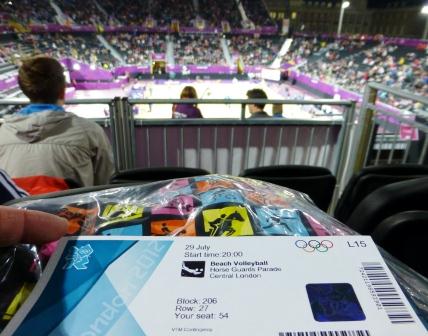
While ‘unbelievable’ seemed to be the word applied an unbelievable number of times to British sporting achievements, ‘bonkers’ seems the most appropriate description to apply to the cultural and social impact of the Olympics – especially after that closing ceremony. Its astonishingly uninhibited chaos mixed flashes of genius with the heroically tacky and cheesy – and slightly sadly probably showed a more accurate reflection of British popular culture than the mesmerising Opening Ceremony.
It feels a world away now but the Opening Ceremony set the tone for what appeared to me to be a staggering transformation in the collective mood – certainly in London.
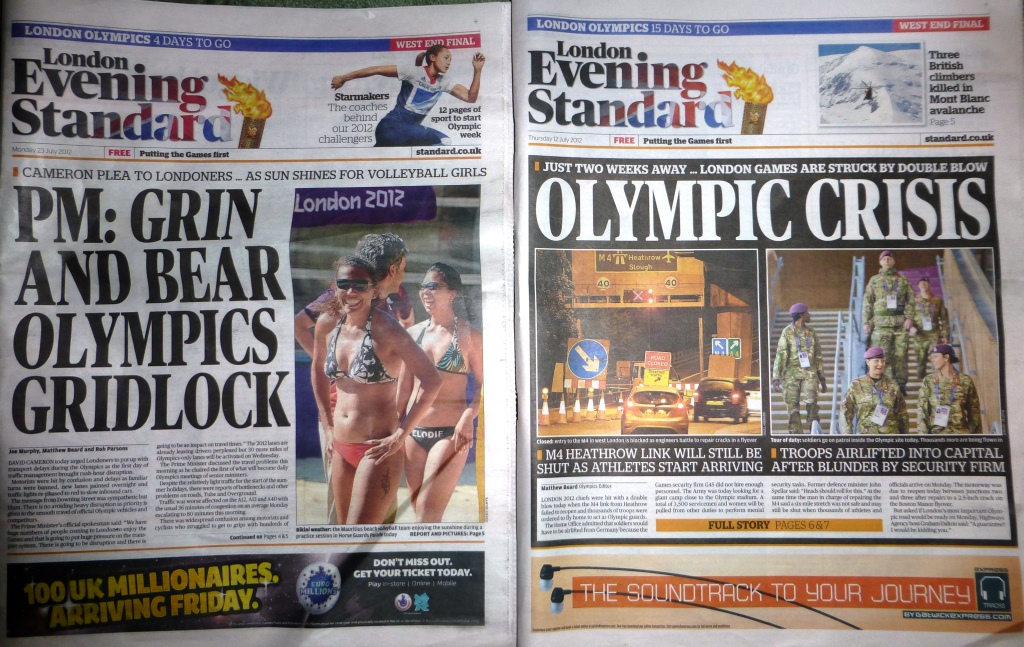
What seemed to make the change in mood of the last couple of weeks genuine — and profoundly touching — was the collective astonishment – we couldn’t believe that we were pulling it off.
Beyond the worries about crowding and traffic there were at least a couple of major problems that could have occurred at this Olympics: terrorism and rioting. Fortunately neither the events of July 2005 or August 2011 were repeated. But we all collectively held our breath and by the end of the games all the doubts, warnings and cynicism were forgotten. Instead we all went bonkers.
Walking around LondonI was reminded of the title of the Jeremy Deller retrospective earlier this year at the Heyward Gallery – Joy in People. And very serendipitously I came across Sacrilege, Deller’s bouncy castle Stonehenge in Victoria Park, Hackney (it only stayed a day in any one place inLondon on its cultural Olympiad tour). I also saw another piece of British bonkerness in Victoria Park – the eccentric Universal Tea Machine.
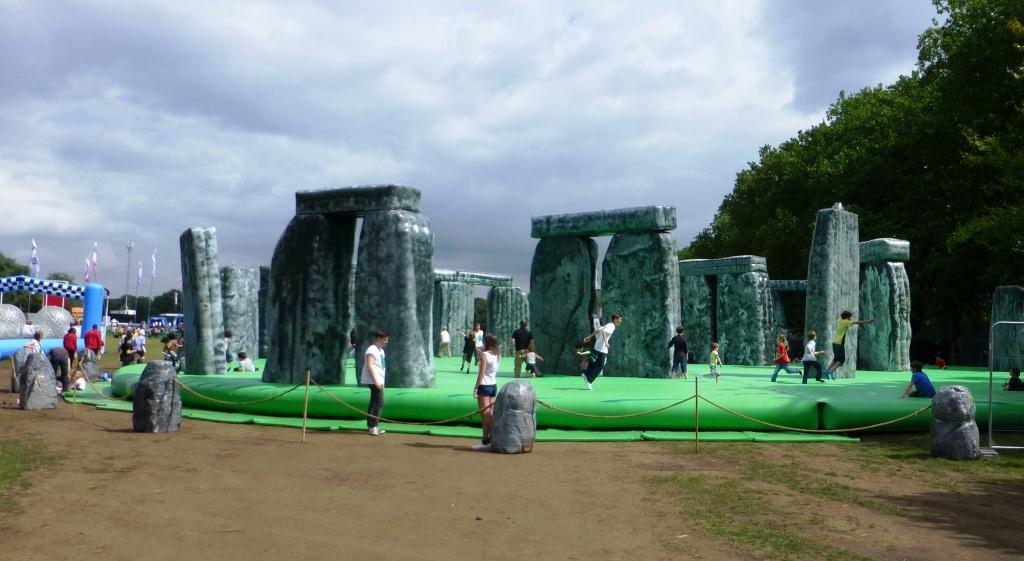
Back to the Opening Ceremony, the first point when I realised that I was watching something really spectacular was an overhead shot of the molten iron circle being symbolically beaten by foundry workers. I thought ‘Hold on that looks a bit familiar’ and the shot cut to two glowing objects moving overhead from the edges of the stadium. Then the molten ring lifted and everyone knows what happened next — the Olympic Rings of Fire were assembled above the stadium.
(I haven’t heard it mentioned elsewhere but I picked up a definite nod to Tolkien’s Lord of the Rings with the green and pleasant land turning into a furnace of fire-beaten rings.)
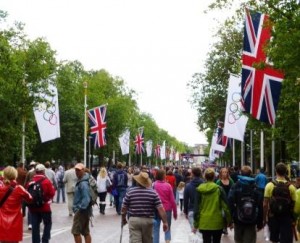
More anything else, for me, Â in the incredible show, it summed up the essence of creativity — taking a symbol as familiar as the Olympic rings and presenting it in an entirely new, innovative way. It was as masterful as reading the denouement of a brilliantly plotted novel — a moment of unexpected, revelatory insight into what came before.
The Opening Ceremony drew on skills in which it was generally acknowledged that Britain was almost uniquely good at – creativity, innovation, contemporary music and design. Although with Britain third in the medal table (and writing just after the closing ceremony) perhaps we should put sport higher on our list of national strengths.
Skills in which Britain leads the world – such as advertising and television – both based on the creative manipulation of imagery – and this has been transferred to the games. It’s amazing to consider the attention to detail involved in London 2012’s branding. The presentation of the venue has been amazing.
The colour scheming of the games has been meticulous – and brilliantly successful in an understated way. The largely restrained palate of colours used for the games was clever: an aqua blue, orange, yellow and the two most prominent – the bright pink and deep purple. These colours don’t clash with many, if any, flags and they simultaneously convey both excitement and informality (the pink) with a stately  self-assured competence (purple).
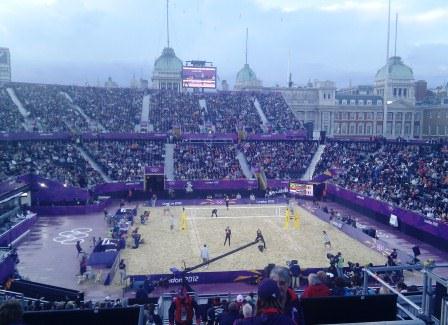
No venue has used design to appear as stunning as the unlikely temporary beach volleyball arena on Horse Guards Parade, which I was lucky enough to get tickets for on the first Sunday of the games. It’s a shame the security fences mean that it’s been difficult for non-ticket holders to get a view of the stadium.
It has seated an incredible 15,000 people and was constructed in the few weeks between Trooping the Colour and the Olympics – and I can say from personal experience it was no ramshackle affair. It had to be solidly built to cope with the energies of the crazed, conga-dancing crowd.
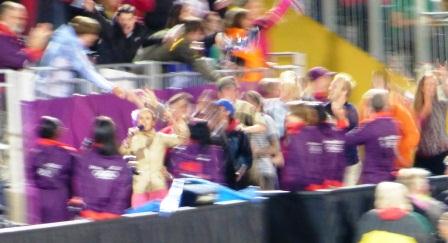
Beach volleyball has been one of the revelations of these Olympics – I’ve read several newspaper articles which, in pre-Olympic times, might have sneered at the event’s supposed frivolous, if not outright exploitative, image but they’ve all concluded that the Horse Guards stadium has provided wonderful entertainment – and that the players are also serious athletes.
I’m normally someone who would run a mile from an event with cheerleaders and similarly mandatory jollity. But faced with the rather un-British beach and tan culture. Londonreacted in the best of British traditions – it took the piss out of it. The staging of the event was staged with such exuberantly over-the-top genius that it even used the Benny Hill theme tune – not to accompany the knowingly camp dancers but for the volunteers who levelled the sand – ‘The Rakers’ (who sounds like an American college basketball team).
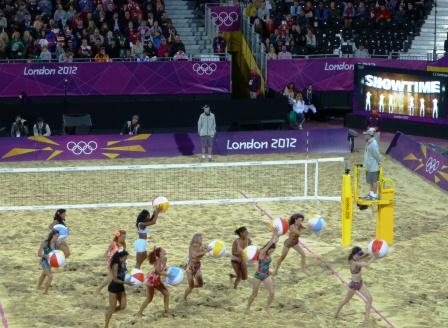
The atmosphere was infectiously surreal – four second blasts of music accompanying the action and absurd crowd participation (a bizarrely eclectic mix of Blur, LMFAO, the Beach Boys and, of course, Dizzee Rascal himself), I doubt many London audiences would jump out of their seats as readily to perform a huge conga around the stadium and when Madness’s One Step Beyond boomed around the seat of British government at 11pm on a Sunday night there were 15,000 pairs of arms moving up and down in unison.
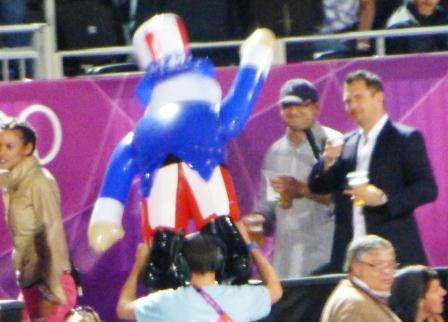
After a while  the over-the-top announcer’s voice became extremely familiar and once the penny dropped there was no doubt – it was the man himself – Peter Dickson – the ridiculously hyperbolic Voice-Over Man from the X-Factor, Britain’s Got Talent and many other programmes. He’s the voice that always seems to announce that this week’s warbler is the ‘biggest selling female artist in the history of the universe’.
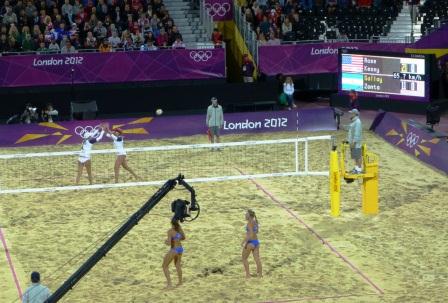
Like everything associated with the rest of the event, Peter Dickson hammed it up spectacularly: ‘I hear the Prime Minister has an early morning tomorrow and he’s asking if we’ll we turn the noise down?’ (Incredibly cheesy but the bizarre location demanded it.) No guessing what the crowd’s answer was.
The setting of Horse Guard’s parade, with the purple-decked stadium, a rectangle of beach sand in its centre and Nelson’s column, Horse Guards, Big Ben and the London Eye visible on the skyline provided an iconic image.
Sitting in the ‘Downing Street End’ of the stadium I wondered what other country would site a beach volleyball stadium within 50 yards of its government’s centre of executive power? Only one that was bonkers. And that sums up the genius of these Olympic games: I had one of the most enjoyable nights of entertainment I can remember in a long time.
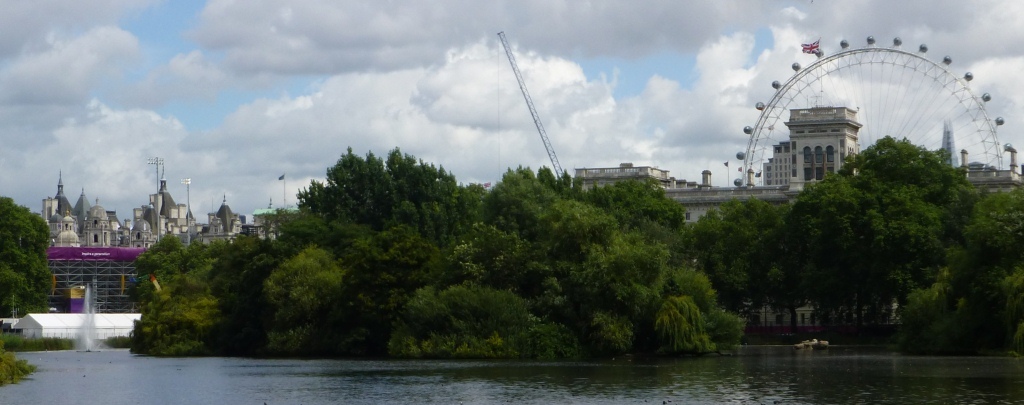

2 Replies to “Bonkers”